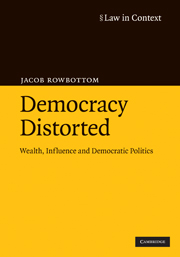Book contents
- Frontmatter
- Contents
- Preface and acknowledgements
- 1 Political equality, wealth and democracy
- 2 Freedom to speak and freedom to spend
- 3 Strategies and reforms
- 4 Access, influence and lobbying
- 5 Beyond equal votes: election campaigns and political parties
- 6 Public spaces, property and participation
- 7 The mass media: democratic dreams and private propagandists
- 8 Participation in the digital era: a new distribution?
- 9 Conclusion
- Index
- References
8 - Participation in the digital era: a new distribution?
Published online by Cambridge University Press: 05 June 2012
- Frontmatter
- Contents
- Preface and acknowledgements
- 1 Political equality, wealth and democracy
- 2 Freedom to speak and freedom to spend
- 3 Strategies and reforms
- 4 Access, influence and lobbying
- 5 Beyond equal votes: election campaigns and political parties
- 6 Public spaces, property and participation
- 7 The mass media: democratic dreams and private propagandists
- 8 Participation in the digital era: a new distribution?
- 9 Conclusion
- Index
- References
Summary
The use of digital technologies may be thought to reduce the importance of wealth in politics. The Internet and new media provide more opportunities and lower the cost for people to communicate, acquire information, pool resources and organise. Under this view, with a more equal distribution of the resources to participate, those with greater economic resources do not have the same power to control the agenda and to influence others. If this view is correct, then the concerns about wealth discussed throughout this book may be less of a problem, or even a thing of the past. However, as this chapter will argue, on closer examination, the impact on the distribution of political resources is more complex.
Idealised accounts of the Internet characterised its early days. For example, in 1995 Eugene Volokh wrote that digital technologies would promote ‘cheap speech’ and ‘make it much easier for all ideas, whether backed by the rich or poor, to enter the marketplace’. Yet, a more sceptical line of argument soon followed, looking at the possible harms that may arise. In a well-known argument, Cass Sunstein suggested that with Internet users having greater control over information received, people would tend to select those sources of information that support their existing outlook. Choice over content could thereby emphasise divisions between different groups of people and lead to polarisation rather than democratic deliberation.
Information
- Type
- Chapter
- Information
- Democracy DistortedWealth, Influence and Democratic Politics, pp. 216 - 244Publisher: Cambridge University PressPrint publication year: 2010
